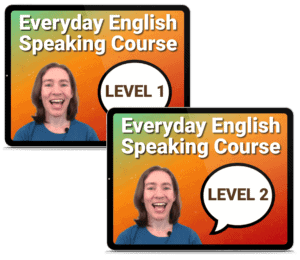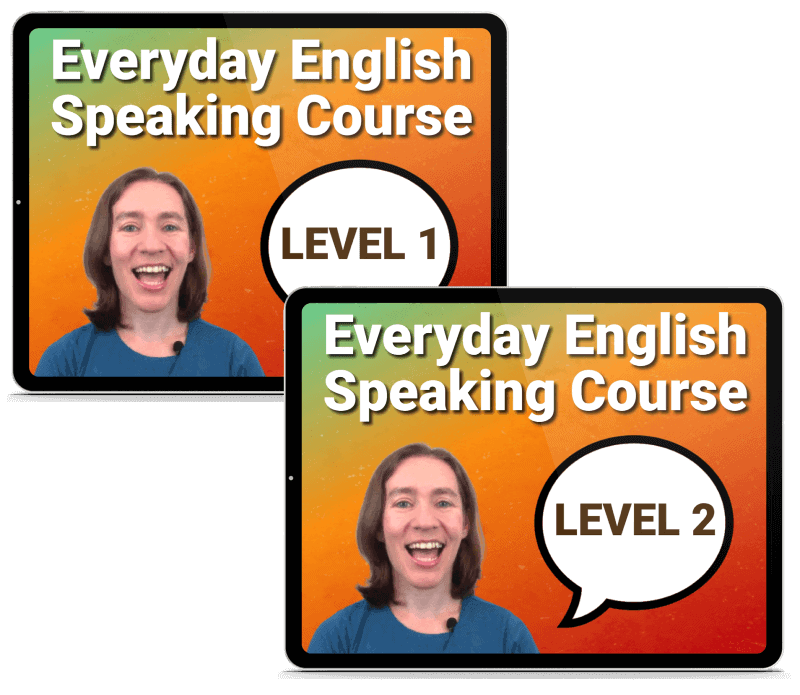
Everyday English Speaking Courses
In the last lesson, you learned how to start a conversation in English. In this lesson, you will learn how to keep a conversation going, without running out of things to say!
If you like learning English from conversations, then you will LOVE my Everyday English Speaking Courses, because each lesson is based on a dialogue. This is a very effective way to learn English phrases in context.
Here’s an example of how not to have an English conversation:
“Did you have a good weekend?”
“Yes, I did. And you?”
“Yeah.”
Unfortunately, the conversation stops here because there’s no natural way to continue it. This is OK if you only want to have a quick conversation – for example, if you are quickly passing a co-worker in the hallway.
But how can you have a longer conversation in English? Let’s look at 3 points that will help you keep a conversation going, and then we’ll see them in practice, in two example conversations.
How to keep a conversation going: 3 keys
- Ask questions that start with Who, What, When, Where, Why, and How. Try to avoid yes/no questions.
- In each of your answers, give one or two details that will help continue the conversation. You don’t need to talk for a long time.
- Talk about these topics:
- Family
- Interests/Hobbies
- Sports
- TV, movies, and popular culture
- Music
- Current events
- Interesting places in the city
- Travel
Unless the other person is a very good friend of yours, avoid topics like politics, religion, sex life, health problems, and personal finances.
Example English Conversations
Here are two example conversations – notice how each person adds one or two details, and then there is a follow-up question about the details to keep the conversation going.
Conversation 1:
“Hey, how was your weekend?”
“Pretty good! I went to a baseball game with my brother.”
“Really? Who was playing?”
“The Yankees and the Red Sox. We’re huge Yankees fans!”
“Yeah? How was the game?”
“Very exciting – it was tied until the last inning, when we won 2-1.”
“Haha, that’s great! I can’t say I’m a baseball fan, myself – I prefer basketball.”
“Basketball, huh? Playing or watching?”
“Both – I’ve played basketball since I was a kid.”
“No kidding! You must be really good.”
“Well, I just play for fun. It’s a great workout.”
“I bet. I could use more exercise myself, but I don’t think I’m cut out for basketball. I was thinking of joining a martial arts class…”
“That sounds interesting! Which one?”
Conversation 2:
“What a beautiful day! It feels like summer!”
“Sure does! I can’t wait for the summer – we’re taking a big family vacation in June.”
“Oh? Where are you going?”
“We’re going to Colorado for a month of hiking and camping. Have you ever been there?”
“Yes, I’ve actually been to Denver twice on business trips… but they didn’t involve any hiking!”
“Haha. How about you – any special plans for the summer?”
“No, not really. I’ll probably take a few weekend trips to visit friends, but I’m saving up my vacation time for December, when I’m going to Costa Rica.”
“Wow! Why Costa Rica?”
“Well, my best friend from college lives there now – she owns a hotel, and she invited me to spend a couple of weeks there to escape the cold winter weather.”
“How wonderful! Do you speak any Spanish?”
“Barely any – only what I remember from classes in high school…”
I think some English learners can be a little afraid of having conversations because they’re afraid they’ll have to speak for a long time.
But as you can see from these examples, each person just says one or two sentences, and then it’s the other person’s turn to speak. It’s a balanced interaction – a conversation involves taking turns, not just one person talking on and on for a long time.
So don’t be scared to have conversations in English! I know you can do it, and remembering the tips from this video will really help you.
Of course, it’s even easier to have conversations when you know lots of phrases to express yourself! You can learn them inside my Everyday English Speaking Courses.
Like I mentioned earlier, the course lessons are based on conversations, so you can learn the phrases naturally.
Now read how to end a conversation in English…


